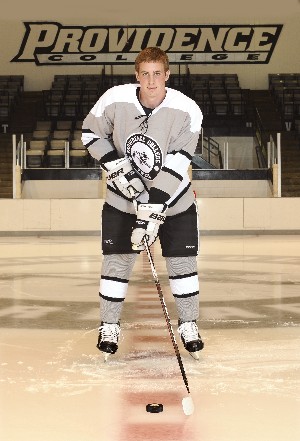As far as Providence coach Tim Army is concerned, we “live in a society that is ‘me’ focused.”
But that “society” doesn’t include freshman forward Tim Schaller.
What Schaller did two years ago transcended anything he could ever accomplish on the ice. Period.
Schaller, a native of Merrimack, N.H., donated his bone marrow to his older brother David who:
• Was diagnosed with testicular cancer in 2006.
• Contracted aplastic anemia a year later, after his cancer was pronounced in remission.
Aplastic anemia is a rare blood disorder — it affects fewer than two people per 1 million in the United States on an annual basis — which causes the bone marrow to fail to produce sufficient numbers of blood cells.
Typically, patients have low blood counts across all three types of blood cells: red, white and platelets.

As a further means of explanation, aplastic anemia causes a person’s immune system to shut down.
“I was the first person tested [for a match] and I was told there was a 25 percent chance of being a match,” Tim Schaller said. “From what I knew, Dave and I didn’t have the same blood type. But it was close enough to where they could clean out his system and put in mine and it would turn out OK.”
Still, think about that number for a minute: 25 percent. That’s a one in four chance, or at the risk of using a baseball metaphor, it’s hitting .250 which, of course, is a mediocre average.
Yet the stakes were much higher than winning a game regardless of sport.
“Forget sports,” Army said. “What Tim did is the type of thing that makes us better as people.
“The percentages weren’t great. But to him, this was his brother. This was in his hands. There wasn’t any concern about his future. It was about making his brother better. To see this family strength is refreshing.”
What the Schaller family went through in 2006 was excruciating.
“When Dave had testicular cancer, I remember the day it happened,” Tim Schaller recalled. “My brother and dad [Robert] had gone to an appointment with a doctor and mom [Susan] got a phone call. Mom broke down crying.”
Dave Schaller underwent chemotherapy which suppressed the cancer.
“He was doing fine,” Tim Schaller said. “In 2007, he had come home from [New England College] and went to a Celtics game with his girlfriend. But he looked pale … yellow.
“Then, he went to see a doctor and was told something was wrong with his blood.”
In a cruel twist of faith, Dave Schaller’s bout with cancer and subsequent chemo had zero to do with his contracting aplastic anemia.
“It was completely out of nowhere,” Tim Schaller said. “It had nothing to do with cancer. He just didn’t have good blood cells.
“Dave went to Brigham and Women’s Hospital [in Boston] and was told he was sick and his immune system was down. In about two weeks, he was told he needed a bone marrow transplant.
“When he was in his [hospital] room, all visitors had to put on gloves and a surgical mask,” the younger Schaller continued. “[The anemia] killed his white blood cells, which affected his immune system. If he got any germ he would get sick quickly and wouldn’t recover from it.”
Not surprisingly, Tim Schaller knew very little about what the procedure required and what might be its aftereffects.
“It was very scary at first. … I didn’t get too much information up front,” he said. “I didn’t know about the procedure and how difficult it was. But when I learned what I could be doing if there was a blood match, there was no way I could have backed out.
— Providence coach Tim Army
“This was my brother. My life was in his hands. When they found out it was a match, in a couple of days they had me on the operating table and had me ready to go.”
The procedure lasted a good two hours.
After it was over, Tim Schaller’s mind essentially was in another world.
“I really wasn’t thinking too straight at the time because I was on drugs,” he said. “Then it hit me afterwards when I saw my brother — it hit me when I saw my bone marrow and blood going into him.”
Dave Schaller recovered to the point where he was able to go on and play hockey for New England College.
Tim Schaller, meanwhile, wasn’t exactly able to step back onto the ice and play with the talent he displayed first at Merrimack High and then with the Eastern Junior Hockey League’s New England Huskies — which attracted Army’s attention.
“I had to be non-active for about six weeks and I gained 30 pounds,” he said. “I weighed 170 and came out at 200. After that, I worked out and lost about 15 pounds.”
Ironically, the bone marrow transplant occurred after Tim Schaller fractured a wrist during hockey season at Merrimack High — which required an operation to repair the damage.
“It took a good couple of months for me to recover from everything,” Tim Schaller said. “But because it was summer, I could concentrate on working out.”
What Schaller did left an indelible impression on the Friars’ Army.
“You don’t know when you go through this process how it’s going to affect you,” he said. “You’re providing something that will save somebody’s life but you don’t know how you’ll respond. It was a selfless act.
“In a sense, it could be a risk to your own health and your own life. A lot of families cope with this every day. There are a lot of intriguing variables in this situation. What Tim did really speaks to his character and integrity.”
How true.


